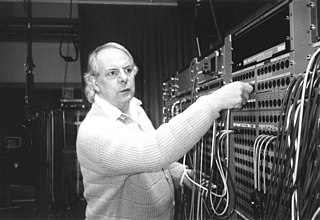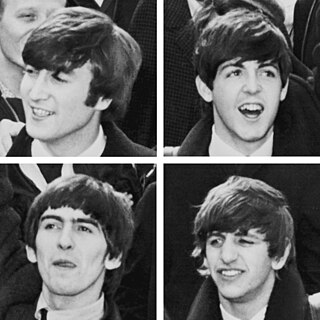
Desiderius Erasmus Roterodamus was a Dutch Christian humanist, Catholic theologian, educationalist, satirist and philosopher. Through his vast number of translations, books, essays, prayers and letters, he is considered one of the most influential thinkers of the Northern Renaissance and one of the major figures of Dutch and Western culture.

Karlheinz Stockhausen was a German composer, widely acknowledged by critics as one of the most important but also controversial composers of the 20th and early 21st centuries. He is known for his groundbreaking work in electronic music, having been called the "father of electronic music", for introducing controlled chance into serial composition, and for musical spatialization.

The Beatles were an English rock band formed in Liverpool in 1960, comprising John Lennon, Paul McCartney, George Harrison and Ringo Starr. They are regarded as the most influential band of all time and were integral to the development of 1960s counterculture and the recognition of popular music as an art form. Rooted in skiffle, beat and 1950s rock 'n' roll, their sound incorporated elements of classical music and traditional pop in innovative ways. The band also explored music styles ranging from folk and Indian music to psychedelia and hard rock. As pioneers in recording, songwriting and artistic presentation, the Beatles revolutionized many aspects of the music industry and were often publicized as leaders of the era's youth and sociocultural movements.
The Qwartz Electronic Music Awards recognize new and electronic music with awards and grants in music and technologies categories. An annual event takes place in Paris. The Qwartz Awards are presided by the pioneer Pierre Henry. Besides the awards, Qwartz organizes an International New and Electronic Music Market, concerts, parties and conferences. The Qwartz Awards recognize all aspects of contemporary art : music, audiovisual works and graphics, instruments, technological innovations, festivals, medias and new media arts. Pierre Henry, Derrick May, Laurie Anderson, Mathhew Herbert, Björk, Wolfgang Voigt, Otavio Henrique Soares Brandao, Ake Parmerud, Henri Pousseur, Can, Klaus Schulze, Lionel Marchetti in particular have already been awarded with a Qwartz d'Honneur.

First Aid Kit is a Swedish folk duo consisting of the sisters Johanna and Klara Söderberg, born in 1990 and 1993 respectively. When performing live, they are accompanied by a drummer, a guitarist and a keyboard player. First Aid Kit started to become internationally known in 2008 with their YouTube uploaded cover of the Fleet Foxes' song "Tiger Mountain Peasant Song". In 2012 Rolling Stone magazine had their song "Emmylou" as 10th on their "Single of the Year" list. First Aid Kit has released five albums, four EPs and several singles. In 2015, they were nominated for a Brit Award as one of the five best international groups. They were nominated again in 2019 and 2023.
Birmingham's culture of popular music first developed in the mid-1950s. By the early 1960s the city's music scene had emerged as one of the largest and most vibrant in the country; a "seething cauldron of musical activity", with over 500 bands constantly exchanging members and performing regularly across a well-developed network of venues and promoters. By 1963 the city's music was also already becoming recognised for what would become its defining characteristic: the refusal of its musicians to conform to any single style or genre. Birmingham's tradition of combining a highly collaborative culture with an open acceptance of individualism and experimentation dates back as far back as the 18th century, and musically this has expressed itself in the wide variety of music produced within the city, often by closely related groups of musicians, from the "rampant eclecticism" of the Brum beat era, to the city's "infamously fragmented" post-punk scene, to the "astonishing range" of distinctive and radical electronic music produced in the city from the 1980s to the early 21st century.

A number of significant scientific events occurred in 2020.

The African humid period is a climate period in Africa during the late Pleistocene and Holocene geologic epochs, when northern Africa was wetter than today. The covering of much of the Sahara desert by grasses, trees and lakes was caused by changes in the Earth's axial tilt; changes in vegetation and dust in the Sahara which strengthened the African monsoon; and increased greenhouse gases. During the preceding Last Glacial Maximum, the Sahara contained extensive dune fields and was mostly uninhabited. It was much larger than today, and its lakes and rivers such as Lake Victoria and the White Nile were either dry or at low levels. The humid period began about 14,600–14,500 years ago at the end of Heinrich event 1, simultaneously to the Bølling–Allerød warming. Rivers and lakes such as Lake Chad formed or expanded, glaciers grew on Mount Kilimanjaro and the Sahara retreated. Two major dry fluctuations occurred; during the Younger Dryas and the short 8.2 kiloyear event. The African humid period ended 6,000–5,000 years ago during the Piora Oscillation cold period. While some evidence points to an end 5,500 years ago, in the Sahel, Arabia and East Africa, the end of the period appears to have taken place in several steps, such as the 4.2-kiloyear event.






